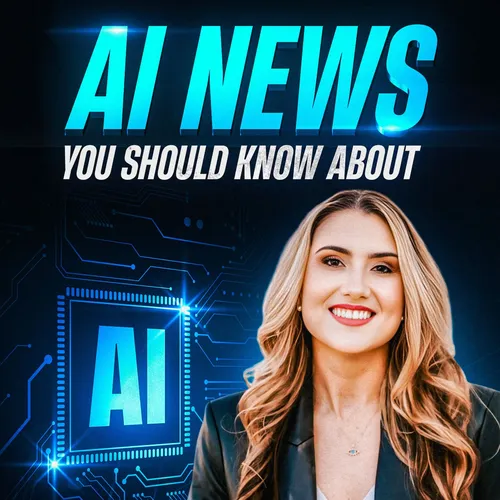7-19-25 - Chat-GPT AI Agents, Open Source Social Media, AI Regulation and More
- Author
- Ashley Coffey, Daniel Hill
- Published
- Sat 26 Jul 2025
- Episode Link
- https://ai-news-you-should-know-about.simplecast.com/episodes/7-19-25-chat-gpt-ai-agents-open-source-social-media-ai-regulation-and-more-DJax9cJe
Today we dive into Open AI's new Chat-GPT agent, Jack Dorsey's investment in an open source social media platform, Meta refusing to sign the EU's AI code of Practice, and Open AI leveraging Google's Cloud for Chat-GPT.
Welcome to "AI News that you should know about" with your hosts, Ashley Coffey and Daniel Hill! This week, we dive into the latest and most impactful AI developments you need to know about.
Episode Highlights:
- OpenAI's New ChatGPT Agent: Discover OpenAI's latest ChatGPT agent, which can control an entire virtual computer and perform tasks for you. This innovative tool combines the "operator" model (task-oriented) and "deep research" model (for exhaustive research) to create a powerful agent. The agent creates a virtual environment with a visual browser and command line, designed to handle "menial tasks" that are time-consuming. It is highly tailored for outputs like spreadsheets and PowerPoints, and demonstrations have shown its ability to plan trips, manage budgets, and even find the best travel prices by avoiding price trackers. While initial tasks might take time and aren't always 100% successful, its potential for offloading numerous daily tasks is significant.
- Jack Dorsey Invests in Open-Source Social Media: Learn about Jack Dorsey, Twitter co-founder and Block CEO, who has invested $10 million in a nonprofit focused on open-source social media. This effort aims to fund experimental projects to transform the social media landscape, which has seen little change since its inception. The funds are funneled through an online collective called "and other stuff," formed in May, whose team includes Dorsey, Twitter's first employee Evan Henshaw Pla Hay, and others. The group has collaborated on Noster, an open, apolitical social networking protocol, and will experiment with other tools like ActivityPub, which powers Mastodon. The core idea is decentralization and the "Fediverse," aiming for a future where a singular social account can travel with users across platforms, eliminating the need for multiple accounts. This initiative explores the possibility of open-source social media where revenue is possible without ads or selling data. However, the permanence of information pushed to wider networks in the Fediverse means it cannot be easily retracted.
- Meta Refuses to Sign EU's AI Code of Practice: We discuss Meta's refusal to sign the European Union's voluntary AI Code of Practice, which is part of the EU's broader AI Act. This framework aims to control AI usage, manage AI access to information, and establish guidelines and guardrails for corporations operating in the EU. Key components include updating documentation about AI tools, banning training AI on pirated content, and requiring companies to comply with content owners' requests not to use their work in AI datasets. Meta's Chief Global Affairs Officer, Joel Kaplan, stated their refusal due to "legal uncertainties" and measures that "go far beyond the scope of the AI act," echoing concerns from other European businesses that it could "throttle the development and deployment of frontier AI models". Ashley Coffey interprets Meta's stance as prioritizing "profit over humanity," suggesting the EU is trying to "slam the brakes on the impact of AI on society," particularly concerning creative output and intellectual property. Europe has a strong history of protecting citizens through data protection laws.
- OpenAI Quietly Turns to Google Systems: Finally, we cover OpenAI's quiet move to add Google Cloud as an official service provider to power ChatGPT and other AI products. Despite being backed by Microsoft and seen as a direct competitor to Google, OpenAI needs external infrastructure support to stabilize its rapidly growing systems. Ashley Coffey notes that 80-90% of the world's infrastructure is on Google or Amazon Web Services. This strategic partnership is seen as beneficial for pushing innovation forward and leveraging better negotiations and collaborations OpenAI has had with Google compared to Microsoft. This move is also speculated to be strategic given Google's antitrust lawsuit and the potential for OpenAI (and Yahoo) to acquire Google Chrome if it were to break away from Google.
Links:
OpenAI’s new ChatGPT Agent can control an entire computer and do tasks for you (The Verge)
Jack Dorsey pumps $10M into a nonprofit focused on open source social media (TechCrunch)
Meta refuses to sign EU’s AI code of practice (TechCrunch)
OpenAI Quietly Turns to Google to Stay Online (Gizmodo)
Connect with the Hosts:
Follow Us:
Ashley Coffey (Instagram) (Threads)
Coffey and Consult (Website) (Podcast)
Daniel Hill (Instagram) (Threads)
The Instagram Stories - Social Media News (Podcast)
